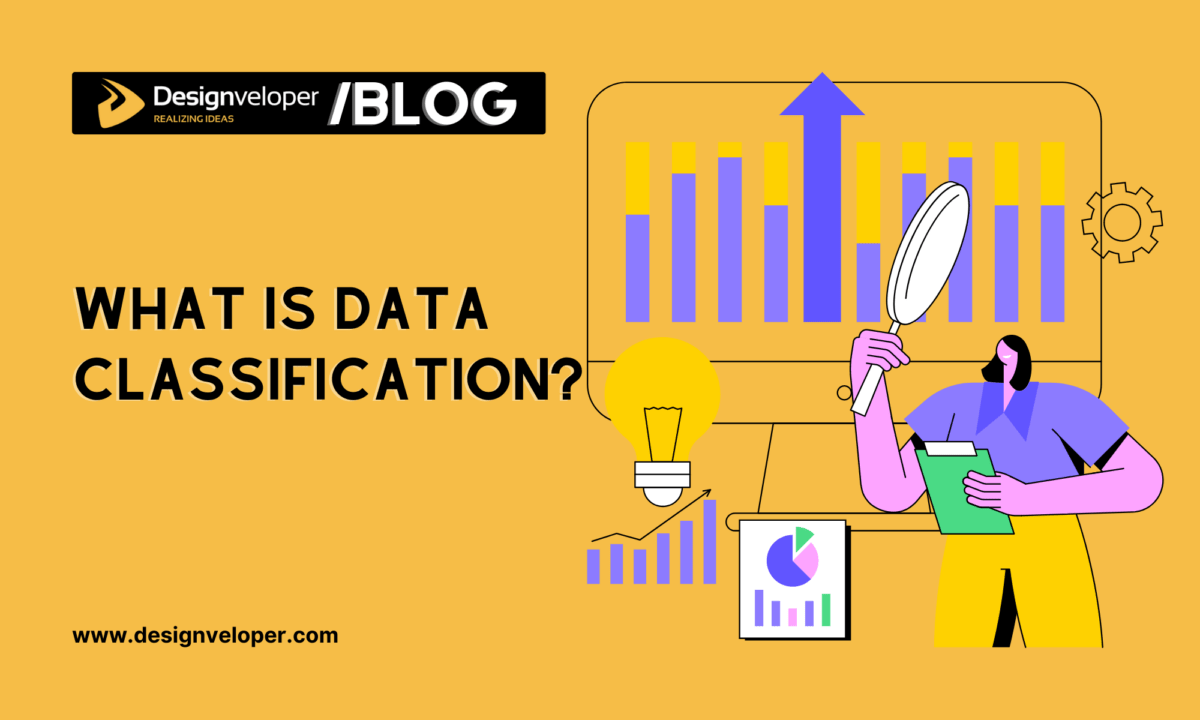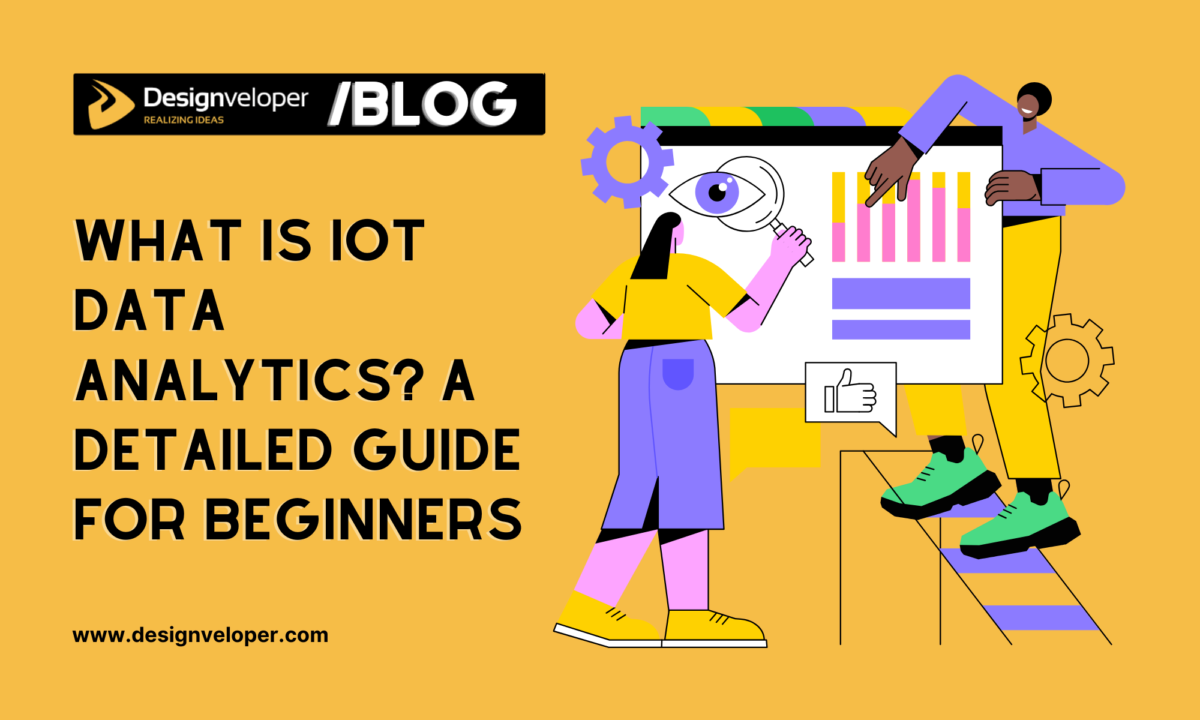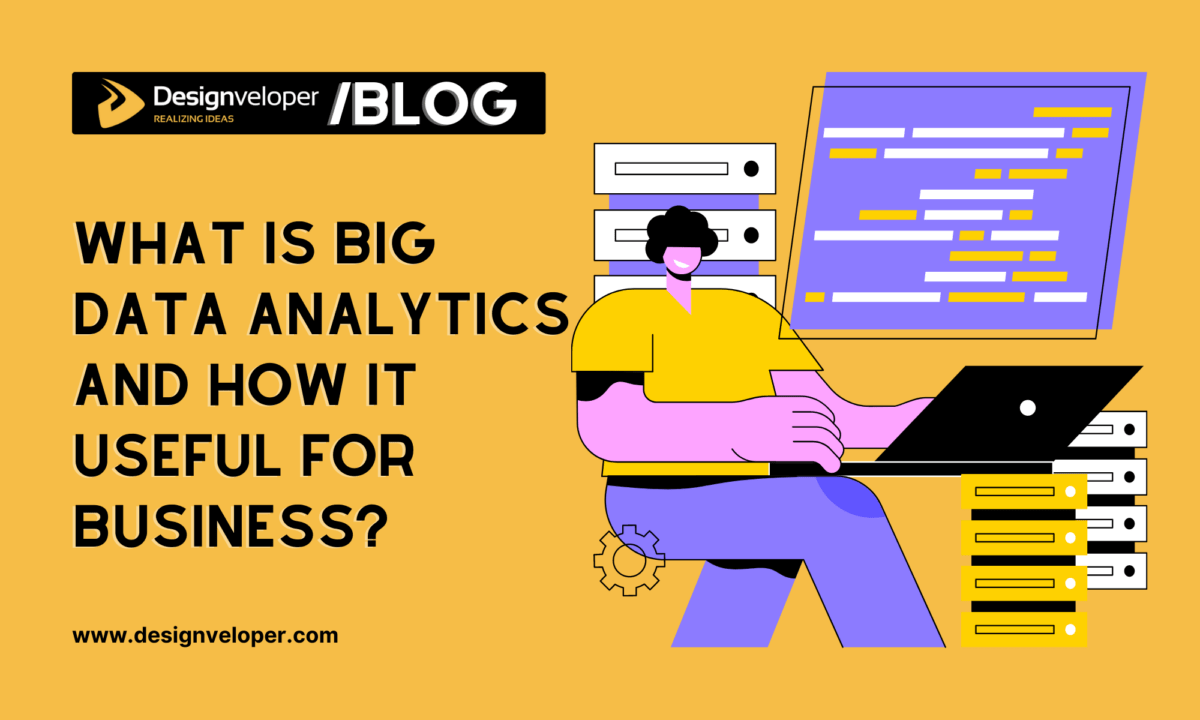
In the world of big data, a Master’s in Data Analytics is a golden ticket. It’s a degree that can help you advance your career, increase your earning potential, and open up a world of opportunities in various industries.
So, are you simply curious about a Master’s in Data Analytics? Or are you considering a career shift into data analytics? Or do you want to advance your current career by attaining a higher educational qualification? Regardless of your ultimate purpose, this article is the right place for you.
In this article, Designveloper (DSV) will dive into the basics of a Master’s in Data Analytics. We’ll also provide a list of the top 10 best Master’s programs to help you make an informed decision about your education.
Now, let’s move to the first part.
Understanding a Master’s in Data Analytics
A Master’s in Data Analytics is a graduate-level degree that equips you with the skills to extract meaningful insights from large and complex datasets. It combines aspects of computer science, statistics, and business strategy, preparing students to make data-driven decisions in various industries.
What Does a Master’s in Data Analytics Entail?
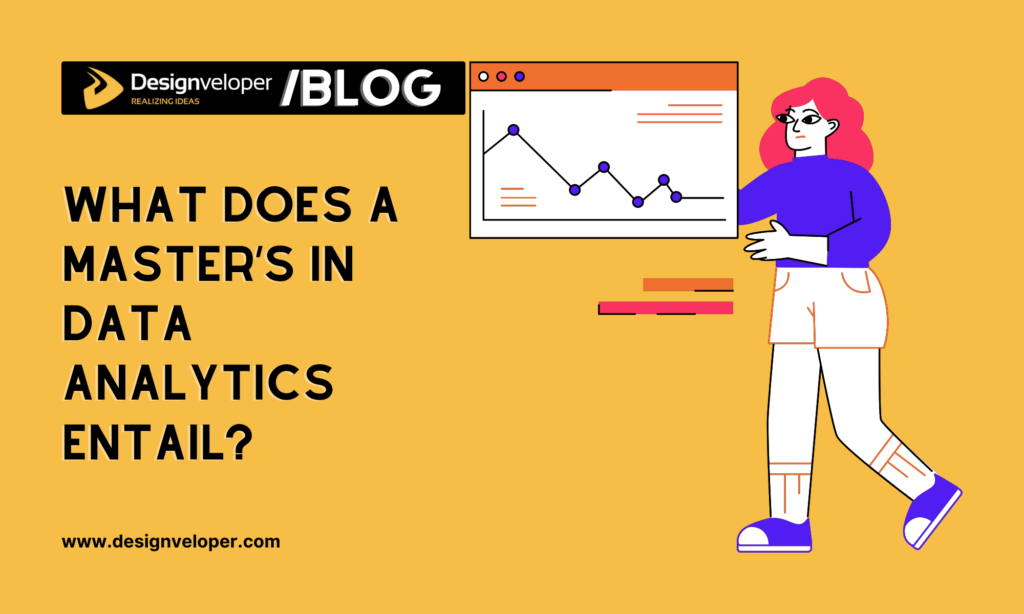
Now, let’s delve into the specifics of a Master’s in Data Analytics. They include the skills you can acquire, the typical duration of the program, and the curriculum that shapes this advanced degree.
Skills Acquired
A Master’s in Data Analytics program typically equips you with a range of technical and business skills. These include:
- Data Management: Understanding how to collect, clean, and store data efficiently.
- Statistical Analysis: Employing statistical techniques to interpret data and derive meaningful insights.
- Machine Learning: Applying machine learning algorithms to predict future trends and behaviors.
- Data Visualization: Presenting data in a visual format that makes complex data understandable and actionable.
- Business Strategy: Understanding how to use data to inform business decisions and strategy.
Typical Duration
The duration of a Master’s in Data Analytics program can vary depending on the institution and whether you’re studying full-time or part-time. However, most programs typically take between 1 to 2 years to complete.
Curriculum
While the curriculum can vary between institutions, most Master’s in Data Analytics programs cover the following core areas:
- Data Science Principles: This includes learning about data structures, algorithms, and computational complexity.
- Statistical Methods for Data Analysis: This involves studying probability, inferential statistics, and regression analysis.
- Machine Learning: You’ll learn about supervised and unsupervised learning, neural networks, and deep learning.
- Data Visualization: This covers the principles of creating effective visual representations of data.
- Business Analytics: This involves learning how to apply data analysis techniques to business problems.
By the end of the program, you’ll have a comprehensive understanding of how to use data to drive decision-making and strategy in a business context.
FURTHER READING: |
1. Data Science vs Data Analytics: A Detailed Comparison |
2. No-Code Data Analytics: A Comprehensive Guide |
3. How Data Analytics Help Businesses: Real Examples & Techs |
Why is a Master’s in Data Analytics Essential?
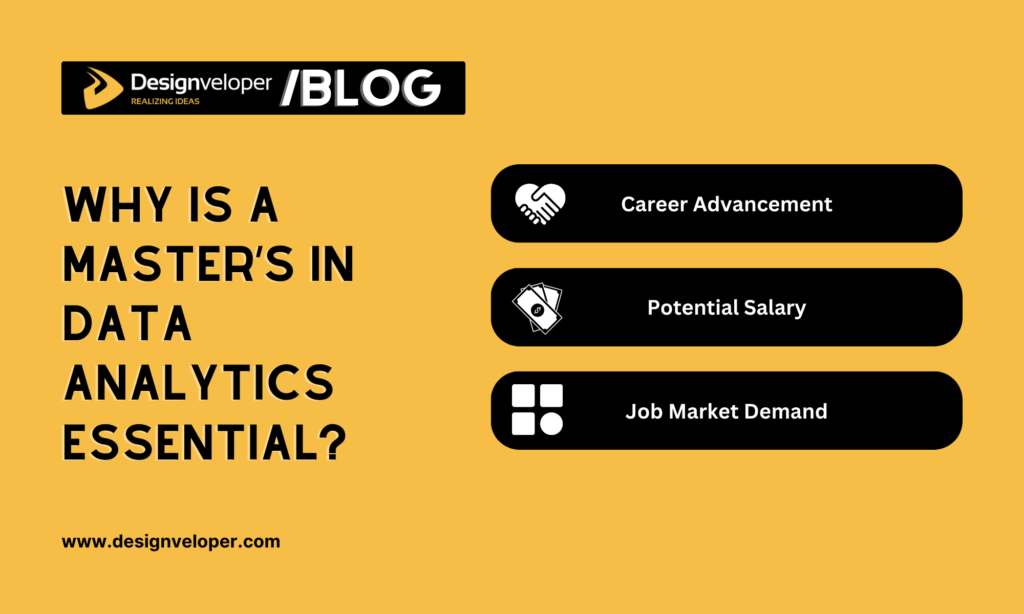
Career One Stop reveals that 39% of data scientists hold a Bachelor’s degree, 36% a Master’s, and 12% a Doctoral or professional degree. This suggests that a Bachelor’s degree might be enough to secure a role in the field.
So, is a Master’s degree still worth considering? The answer largely depends on your personal goals, resources, and background.
In case you’re hesitating about whether to earn a Master’s in Data Analytics, let’s explore some of its tangible benefits:
Career Advancement
A Bachelor’s degree is often the minimum requirement for entry-level data analytics roles. It provides a broad understanding of the field and equips individuals with basic skills. However, a Master’s degree is particularly beneficial for those who don’t have a Bachelor’s degree in data analytics but are considering a career transition.
It’s also a valuable asset for those who wish to delve deeper into data analytics from an academic perspective. If you’ve earned a Bachelor’s degree in a related field like statistics or computer science, a Master’s in data analytics could deepen your understanding of the field and enhance your appeal to potential employers.
Moreover, a Master’s degree can be instrumental in advancing your current career. It offers more advanced knowledge and skills through specialized courses in areas such as machine learning, data analytics, and statistics. This could make you a more competitive candidate. And in some cases, a Master’s degree might even be a prerequisite for senior positions.
Potential Salary
Research by the U.S. Bureau of Labor Statistics (BLS) paints a clear picture: higher education often translates to higher earning potential. For example, Master’s graduates typically bring in USD 1,574 per week, compared to USD 1,334 for Bachelor’s holders.
Focusing on the specific field of Data Analytics, a 2018 Burtch Works study reveals even more compelling figures. Professionals with a Master’s degree in Data Analytics command a median base salary of USD 92,500. This number significantly exceeds the already impressive earnings associated with a Bachelor’s degree.
These figures highlight investing in a Master’s in Data Analytics can be a strategic career move with the potential for lucrative returns. This degree positions you for leadership roles, opens doors to exciting opportunities, and equips you with skills in high demand across various industries.
Job Market Demand
The global data analytics market is exploding. It’s projected to reach a staggering USD 393.35 billion by 2032, fueled by a 29.4% CAGR. This isn’t a surprise. Businesses increasingly recognize data as their strategic advantage, turning to analytics to optimize operations, predict trends, and make informed decisions.
This data boom creates a ripple effect. As data volume and complexity surge, data analytics roles like data scientists and analysts become increasingly nuanced.
Accordingly, these roles demand candidates to master using advanced techniques like machine learning to facilitate tasks, while owning more advanced data analytics skills to extract meaningful insights. This is where a Master’s in Data Analytics equips you for success.
Also, the BLS highlighted a lower unemployment rate (2.6%) for Master’s graduates compared to Bachelor’s holders (3.5%). It means that earning a Master’s equips you with the technical expertise and skills to stand out and stay competitive in this market.
Industries & Jobs for Professionals with a Master’s in Data Analytics
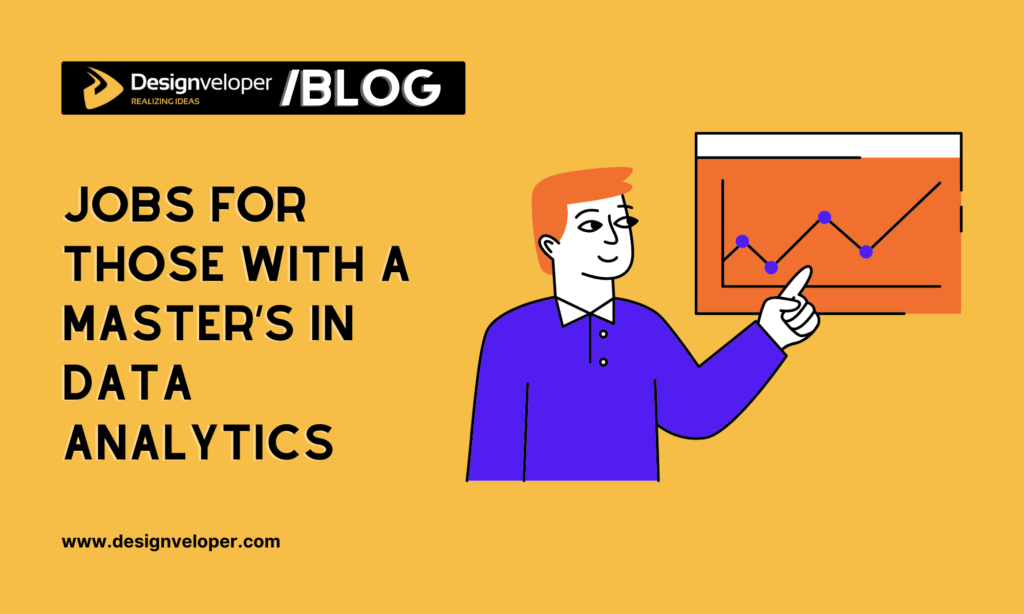
Data analytics is a rapidly growing field with applications in a wide range of industries. Professionals with a Master’s in Data Analytics can find rewarding careers in sectors such as:
Healthcare
In the healthcare industry, data analytics is used to predict disease trends, improve patient care, and optimize hospital operations. Jobs in this sector include Healthcare Data Analyst, Clinical Data Analyst, and Biostatistician. These professionals use data to make informed decisions that can improve patient outcomes and streamline healthcare delivery.
Finance
Financial institutions harness the power of data analytics to evaluate risks, detect fraudulent activities, and devise investment strategies. Roles in this industry include Quantitative Analyst, Risk Analyst, and Financial Data Analyst. These professionals use statistical analysis and mathematical modeling to solve complex business problems and improve financial performance.
Retail
Retailers use data analytics for inventory management, customer segmentation, and sales forecasting. Jobs in this sector include Retail Data Analyst, Customer Insight Analyst, and Market Research Analyst. These professionals analyze consumer behavior and market trends to drive sales and improve customer satisfaction.
Technology
Tech companies use data analytics for product development, user experience optimization, and market research. Roles in this industry include Product Analyst, User Experience (UX) Analyst, Business Intelligence Analyst, and Data Scientist. These professionals use data to inform product design, understand user behavior, and identify market opportunities.
Government
Governmental agencies use data analytics for policy-making, public health management, and resource allocation. Jobs in this sector include Government Data Analyst, Policy Analyst, and Program Evaluation Analyst. These professionals use data to inform policy decisions, manage public resources, and evaluate program effectiveness.
Manufacturing
In manufacturing, data analytics is used for quality control, supply chain optimization, and predictive maintenance. Roles in this industry include Manufacturing Data Analyst, Supply Chain Analyst, and Quality Assurance Analyst. These professionals use data to improve manufacturing processes, manage supply chains, and ensure product quality.
Education
In the education sector, data analytics is used for student performance analysis, curriculum development, and institutional planning. Roles in this industry include Educational Data Analyst and Institutional Research Analyst. These professionals use data to understand student outcomes, inform curriculum design, and guide institutional strategy.
The demand for data analytics professionals is high and continues to grow, making this a promising career path for the future. Whether you’re interested in healthcare, finance, or any industry, there’s a data analytics role for you.
Top 10 Master’s in Data Analytics Programs
You’ve already understood the significance of a Master’s in Data Analytics for your career path. And now, you might be on the hunt for the perfect program. To aid you in this crucial decision, DSV has compiled a list of the top 10 Master’s in Data Analytics programs. Now, let’s delve into these options:
M.S. in Statistics and Data Science, Stanford University

Stanford’s M.S. in Statistics and Data Science program is designed to equip you for successful careers upon graduation.
The curriculum is a blend of statistics, data science, and computer science, with courses in probability, data mining, applied matrix theory, and causal inference. It lasts 5 or 6 quarters (excluding summer).
This program doesn’t provide a direct route to the Statistics Ph.D. program. However, suppose you have a robust academic background in statistics and probability theory, and a demonstrated potential for in-depth research. In that case, you’re still encouraged to consider applying to the doctoral program in Statistics.
M.S. in Data Science, Columbia University

This Master’s program provides a solid foundation in computer science and specialized algorithmic, statistical, and systems expertise to handle and analyze large, diverse, and real-time data.
The curriculum includes computer science, engineering, statistics, and DSI electives such as applied machine learning or causal inference for data science. Further, you have the opportunity to undertake original research, engage in a capstone project, and interact with world-class industry partners.
While the program is primarily designed for data science students, non-data science students can also register or join a waitlist via SSOL.
Master of Analytics, University of California (UC)

The University of California, Berkeley, offers a 12-month program that blends theoretical instruction with hands-on experience.
This in-person program covers core analytics methods (i.e., Analysis and Design of Databases and Machine Learning & Data Analytics), elective specialty courses (i.e., Financial Engineering Systems or Healthcare Analytics), and a summer internship.
In addition to the rigorous academic curriculum, Berkeley Analytics provides extensive student support, including career counseling and industry networking, propelling students toward success beyond the confines of the classroom.
For those who may not have the flexibility to participate in this in-person program, the university offers the Master of Information and Data Science (MIDS). This is an online, part-time professional degree program.
M.S. in Analytics, Georgia Institute of Technology

The M.S. in Analytics at Georgia Tech is a comprehensive blend of statistics, operations research, computing, and business.
Georgia Tech provides three distinct pathways for those pursuing a Master’s in Analytics. They include:
- The on-campus M.S. in Analytics program can be completed in one year. It includes benefits such as dedicated job placement assistance, on-campus analytics job fairs, and a conference travel budget for each student.
- The online M.S. in Analytics (OMS Analytics) program offers the flexibility to earn the same degree remotely over one to two years, with the same access to Georgia Tech’s faculty expertise.
- The on-campus M.S. in Analytics program is offered in Shenzhen, China. It can be completed in a year and a half.
Whether your choice, you’ll be guided by world-class faculty to manage large and fast-moving data streams, develop mathematical models using appropriate methodologies, and more.
Beyond the core areas of analytics, you also have 15 credits of electives in Analytical Tools, Business Analytics, and Computational Data Analytics. So, you can tailor you elective choices to align with you individual career goals.
Master of Applied Data Analytics, University of Melbourne

The Master’s program is tailored to fulfill the escalating demand for information analysis across various sectors.
This 100% online course empowers you to apply analytic solutions to real-world operational and strategic issues.
In this course, you’ll cultivate a deeper understanding of data analytics – its potential, its limitations, and its pitfalls – and learn how to analyze data to make more informed organizational decisions and forecasts.
The Master of Applied Data Analytics is ideal for those who aspire to enhance processes, systems, and outcomes in their workplace through data analysis, and to broaden and advance their career paths by becoming proficient in analytics techniques.
MSc Data and Decision Analytics, University of Edinburgh

The University of Edinburgh’s Business School offers a part-time MSc Data and Decision Analytics program. Spanning 24 months, the program equips you with the ability to not only analyze and interpret data but also to convert this into effective decision-making in the era of big data.
Delivered through a blend of live online sessions and asynchronous activities, this program combines theoretical knowledge with practical hands-on experience.
Besides, the program exposes you to a unique and balanced suite of courses in the two most crucial areas of analytics: predictive and prescriptive. It also includes cutting-edge elective courses (e.g., Data Management or Analytics of Decision Making under Multiple Criteria). These courses enable you to leverage the most innovative and efficient methods to tackle data and decision analytics problems.
MSc in Data Science and Business Analytics, Bocconi University

Bocconi University’s MSc program is for those with a strong inclination towards Computational, Statistical, and Mathematical Sciences and a genuine passion for working with data.
This two-year program lays a solid foundation in theoretical and applied statistics and machine learning.
Accordingly, you may cultivate advanced skills in computer science, which are essential for building algorithms and programming tools. In addition, you can develop quantitative skills and knowledge of corporate dynamics to assist management in making strategic decisions based on data analysis.
Upon successful completion of this MSc program, you’ll acquire the necessary knowledge to become a data analytics specialist or pursue your PhD career.
Master of Data Analytics, Queensland University of Technology

This program equips you with professional knowledge to advance your career in data analytics.
With a curriculum that encourages interdisciplinary collaboration, you’ll learn specialist units in advanced statistical data analysis, data mining techniques and applications, data manipulation, analytics for information professionals, and advanced stochastic modeling.
The program duration ranges from 1 to 2 years for full-time students and 2 to 4 years for part-time students.
Besides, it offers three distinct majors, including Biomedical Data Science, Computational Data Science, and Statistical Data Science. Even in case you have no interest in these majors, you still have a “No Major” option.
Master in Data Science for Business, École Polytechnique

This program, a collaborative effort between École Polytechnique and HEC Paris, provides a unique opportunity to study at two globally renowned institutions known for their excellence in engineering and business.
It spans two years as follows:
Year 1
The first year of the program, hosted at École Polytechnique, emphasizes scientific and mathematical topics. It also includes a 4-month internship with a company in a data-related sector, like Microsoft or Facebook.
Besides, you have a chance to join Data Camps, which take place one day every week. During these sessions, students work on data science cases in collaboration with companies. As such, they learn how to perform a complete data analysis: from data manipulation to analysis with powerful machine learning methods.
Year 2
The second year, on the other hand, is conducted at HEC Paris. It employs experiential learning methodologies to enhance your management knowledge and apply it to solve intricate business challenges. Accordingly, students will choose between three specialization tracks: Data Manager, Data Entrepreneur, and Data Consultant.
Master’s in Data Analytics, Penn State Great Valley

Penn State Great Valley now offers two distinguished Master’s programs in Data Analytics: the Master of Professional Studies and the Master of Science. The former is for those advancing careers in the data-driven industry, while the latter is designed to pave the way for research and Ph.D. programs. The programs are delivered in a hybrid format, blending in-person and online learning.
Participating in these programs, you can engage in relevant projects in collaboration with alumni and local employers, fostering valuable industry connections, networking opportunities, and potential job prospects. Also, you can benefit from a STEM-designated program, allowing a total of 36 months of Optional Practical Training (OPT).
Conclusion
After this article, you already know what a Master’s in Data Analytics entails, its importance in today’s data-driven world, and the potential career paths you can embark on after graduation. We’ve also highlighted the top 10 Master’s in Data Analytics programs, each offering a unique blend of curriculum, flexibility, and reputation.
Whether you’re considering a career shift or advancing your current job, a Master’s in Data Analytics could be the key to unlocking your potential. So, take the leap and let your journey in the exciting world of data analytics begin!






Read more topics
















































